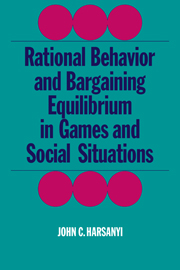Book contents
- Frontmatter
- Contents
- Preface
- Part 1 Preliminaries
- Part II General principles
- Part III Solutions for specific classes of games
- 8 Two-person simple bargaining games: the Nash solution
- 9 General two-person cooperative games
- 10 n-Person simple bargaining games
- 11 n-Person cooperative games with transferable utility: the modified Shapley value
- 12 n-Person cooperative games: the general case
- 13 n-Person cooperative games: discriminatory solutions
- 14 Noncooperative and almost-noncooperative games
- 15 Conclusion
- Notes
- References
- Index
- Frontmatter
- Contents
- Preface
- Part 1 Preliminaries
- Part II General principles
- Part III Solutions for specific classes of games
- 8 Two-person simple bargaining games: the Nash solution
- 9 General two-person cooperative games
- 10 n-Person simple bargaining games
- 11 n-Person cooperative games with transferable utility: the modified Shapley value
- 12 n-Person cooperative games: the general case
- 13 n-Person cooperative games: discriminatory solutions
- 14 Noncooperative and almost-noncooperative games
- 15 Conclusion
- Notes
- References
- Index
Summary
In the preceding chapters I have tried to propose a precise definition – or more exactly a family of precise definitions – for the concept of rational behavior. In the case of individual pragmatic decisions I have argued that rational behavior can be defined in terms of utility maximization, or expected-utility maximization, in accordance with modern decision theory (and modern economic theory). In the case of moral decision I have suggested the utilitarian criterion as the appropriate rationality criterion, involving maximization of the average utility of all individuals in the society.
Finally, in the case of game situations I have argued that we need a concept of rational behavior yielding a determinate solution (i.e., a unique solution payoff vector) for each specific game. For various classes of cooperative and of noncooperative games I have suggested a number of solution concepts, all related to the Nash-Zeuthen bargaining solution, to the modified Shapley value, and to their various generalizations. Though the solution concepts suggested for different game classes have differed in specific detail, all have been based on the same general rationality postulates. My discussion, however, has been restricted to what I have called “classical” games (i.e., to games with complete information, either fully cooperative or fully noncooperative in character, and admitting of representation by their normal form) – even though, as I have shown in other publications, one can extend this analysis also to certain classes of “nonclassical” games (e.g., to games with incomplete information [Harsanyi, 1967, 1968a, 1968b; Harsanyi and Selten, 1972]).
- Type
- Chapter
- Information
- Publisher: Cambridge University PressPrint publication year: 1977



